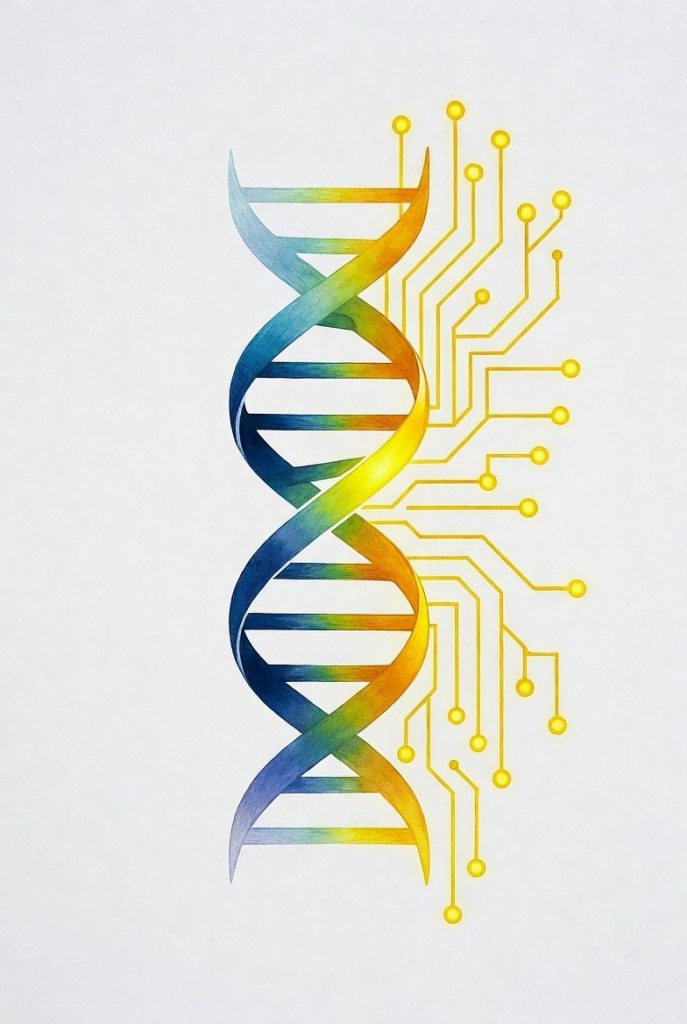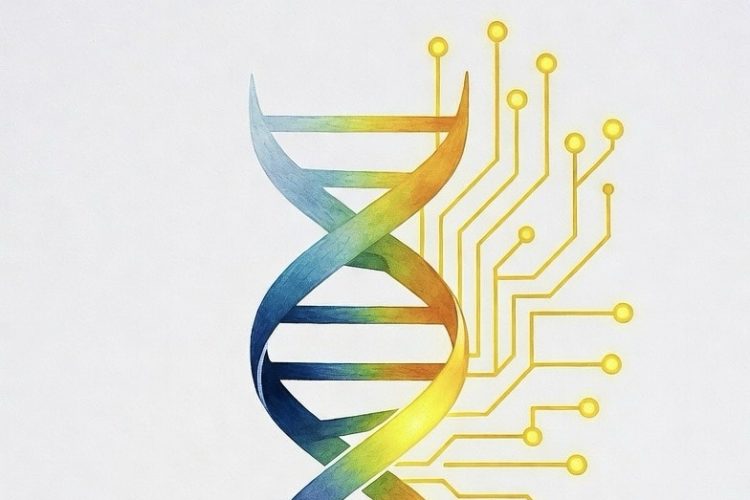AI is transforming healthcare by using machine learning and deep learning on big data from genomics, proteomics, and bioinformatics to speed up drug discovery, diagnosis, treatment, and prognosis. Tools like AlphaFold predict protein structures for in silico testing, while generative AI designs new molecules and repurposes drugs for diseases like IPF and rare conditions. AI-driven diagnostics detect cancer and rare diseases early by analyzing biological pathways and biomarkers. Precision medicine tailors treatments to individual genetics, and robotic labs with virtual cells automate experiments. In 2025, AI cuts drug development time and costs by up to 70%, maps gene networks, and enables personalized therapies. Future advances aim for longevity escape velocity, curing all diseases by 2035–2050 through gene editing, epigenetic therapies, and simulated biology—despite challenges in data bias and ethics.
Long Version
In the rapidly evolving landscape of healthcare, artificial intelligence (AI) is reshaping how we approach medicine, particularly in curing diseases through biological mechanisms. By leveraging machine learning and deep learning algorithms on big data from bioinformatics, genomics, and proteomics, AI enables breakthroughs in drug discovery, treatment, diagnosis, and prognosis. This integration of biotechnology with computational biology is not just accelerating processes but also unlocking new therapeutic targets and biological pathways that were previously inaccessible. As of 2025, advancements have accelerated, with AI now predicting disease progression with unprecedented accuracy and designing personalized interventions that could eradicate many illnesses within the next decade.
Revolutionizing Drug Discovery with AI
Drug discovery, traditionally a lengthy and costly process in the pharmaceutical industry, is being transformed by AI’s ability to simulate biology and predict outcomes. Tools like AlphaFold have revolutionized protein structure prediction, allowing researchers to understand molecular biology at an unprecedented level. By analyzing protein sequences, these models generate accurate 3D models, facilitating in silico testing of potential drugs against therapeutic targets. This has expedited the identification of chemical structures and drug targets, reducing the time from hypothesis generation to viable candidates.
Generative AI further enhances this by designing novel molecules. Platforms use generative models to screen billions of compounds, identifying promising ones for diseases like idiopathic pulmonary fibrosis (IPF). In recent developments, AI-discovered inhibitors have advanced to clinical trials, demonstrating safety and efficacy in reversing disease markers. Similarly, drug repurposing—reusing existing drugs for new indications—benefits from AI’s analysis of biological mechanisms and phenotypic features. AI models can predict interactions between inflammatory molecules and disease states, repurposing drugs for rare diseases like Castleman disease.
AI-driven robotic labs automate experimentation, integrating with simulated biology to create virtual cells that model cellular pathology and test interventions. This approach, combined with ontologies like the Medical Action Ontology (MAxO), standardizes data for better biomarker identification and drug target validation. The Biomedical Data Translator exemplifies this, aggregating multi-omics data to generate hypotheses for complex conditions. In 2025, these tools have become mainstream, with AI slashing drug development timelines from years to months and reducing costs by up to 70%.
Enhancing Diagnosis and Prognosis Through Biological Insights
AI-driven diagnostics are pivotal in early disease detection, using machine learning to analyze genomics and proteomics data for precise prognosis. In cancer, AI identifies genetic mutations and biological pathways, predicting disease progression and response to treatments. Models map gene networks to reverse cellular disease states, identifying optimal drug targets significantly faster than traditional methods. This has rediscovered known targets and uncovered new ones across multiple cancers.
For rare diseases, AI processes big data to pinpoint biomarkers and idiopathic causes, as seen in IPF and Castleman disease. Deep learning algorithms integrate phenotypic features with molecular biology, enabling proactive interventions. In infectious diseases, AI designs antibodies by simulating immune responses, potentially curing conditions through targeted gene editing like CRISPR. Recent innovations include AI models that identify antibody drugs for a variety of infectious diseases, sifting through millions of possibilities to find effective treatments.
Moreover, new methods in 2025 enhance AI reliability, incorporating data from autoimmune conditions to reduce false positives in cancer detection. This has led to tests with high sensitivity and improved accuracy, transforming how diseases are diagnosed.
Precision and Personalized Medicine: Tailoring Biology to the Individual
Precision medicine and personalized medicine represent AI’s core strength in biology-driven cures. By analyzing individual genomics, AI customizes treatments, optimizing dosages and combinations based on biological mechanisms. End-to-end platforms identify novel targets and design molecules for personalized therapies. This extends to longevity research, where AI explores radical abundance and longevity escape velocity by modeling aging pathways.
AI’s role in cell pathology analysis allows for virtual simulations of patient responses, reducing trial failures. Tools use AI to rejuvenate cells, converting them to stem cell states more efficiently. This convergence with gene editing technologies promises cures for age-related diseases, transforming healthcare from reactive to predictive. In 2025, AI is enabling instantaneous generation of novel antibody drugs and improving target selection, paving the way for custom medicines that address desired health states.
Applications in Specific Diseases and Broader Impacts
In cancer, AI’s integration with biotechnology has led to faster identification of therapeutic targets, with models predicting protein interactions and drug efficacy. For rare diseases affecting millions, open-access AI models repurpose drugs by analyzing semantic queries and biological data. Initiatives aim to cure all diseases by 2100 through frontier AI models trained on vast biological datasets, including virtual immune systems for real-time inflammation tracking. These efforts are accelerated by AI, potentially achieving goals significantly sooner.
Beyond oncology, AI addresses neurodegenerative and autoimmune conditions by simulating biological pathways and inflammatory molecules. Digital trials, simulating millions of patients, accelerate development while ensuring accuracy. Agentic AI has built molecular architectures of diseases, mapping conditions by genetic pathways and uncovering hidden links, like those between Alzheimer’s and eye cancer. This molecular disease atlas is revolutionizing classification and drug repurposing.
Epigenetic therapies and gene modifications are advancing, with predictions that by the mid-2030s, nanobots could heal the body from within, eradicating aging. CRISPR gene editing is achieving high accuracy in trials, potentially erasing thousands of genetic illnesses. AI is also modeling disease spread and optimizing pathways for treatments, speeding up cures for rare diseases and superbugs.
Future Prospects and Challenges
The future of AI in healthcare lies in deeper integration with biology, from hypothesis generation to robotic lab automation. Advances in generative AI and simulated biology could achieve radical abundance in treatments, pushing toward longevity escape velocity. Predictions suggest that by 2035, AI could cure all major diseases by predicting them before symptoms, designing perfect interventions, and optimizing individual treatments. By 2050, disease and aging may no longer exist, leading to reengineered human biology.
However, challenges remain: ensuring data quality, addressing biases in models, and navigating regulatory hurdles for AI-discovered drugs. Ethical considerations, such as transparency in AI decision-making and equitable access, are crucial for building trust. Initiatives focus on collaborative environments, sharing data, and creating impactful models to tackle disease roots.
As AI continues to evolve, its synergy with biology promises a paradigm shift in medicine, offering cures that are not only effective but also biologically attuned to human complexity. This authoritative convergence is set to redefine healthcare, making disease eradication a tangible reality sooner than anticipated.







